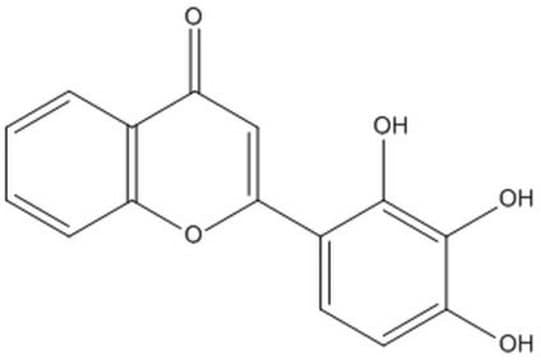5.08197
Ginkgolic Acid (15:1)
InSolution, ≥98%, 25 mM in DMSO
Sinónimos:
InSolution Ginkgolic Acid (15:1), Histone Acetyltransferase Inhibitor VI, PCAF Inhibitor II, HAT Inhibitor VI, SUMOylation Inhibitor, ( Z)-6-(Pentadec-8-enyl)-2-hydroxybenzoic acid, ( Z)-2-Hydroxy-6-(pentadec-8-enyl)benzoic acid, Histone Acetyltransferase Inhibitor VI, PCAF Inhibitor II, HAT Inhibitor VI, SUMOylation Inhibitor, (Z)-6-(Pentadec-8-enyl)-2-hydroxybenzoic acid, (Z)-2-Hydroxy-6-(pentadec-8-enyl)benzoic acid
About This Item
Productos recomendados
Quality Level
assay
≥98% (HPLC)
form
liquid
manufacturer/tradename
Calbiochem®
storage condition
OK to freeze
avoid repeated freeze/thaw cycles
desiccated (hygroscopic)
protect from light
storage temp.
−70°C
InChI
1S/C22H34O3/c1-2-3-4-5-6-7-8-9-10-11-12-13-14-16-19-17-15-18-20(23)21(19)22(24)25/h7-8,15,17-18,23H,2-6,9-14,16H2,1H3,(H,24,25)/b8-7-
InChI key
YXHVCZZLWZYHSA-FPLPWBNLSA-N
General description
Biochem/physiol Actions
SUMO-activating enzyme E1
Packaging
Warning
Physical form
Reconstitution
Other Notes
Legal Information
Storage Class
10 - Combustible liquids
wgk_germany
WGK 2
flash_point_f
188.6 °F - (refers to pure substance)
flash_point_c
87 °C - (refers to pure substance)
Certificados de análisis (COA)
Busque Certificados de análisis (COA) introduciendo el número de lote del producto. Los números de lote se encuentran en la etiqueta del producto después de las palabras «Lot» o «Batch»
¿Ya tiene este producto?
Encuentre la documentación para los productos que ha comprado recientemente en la Biblioteca de documentos.
Contenido relacionado
Select different protease inhibitor types based on your needs to prevent protein degradation during isolation and characterization and safeguard proteins in sample prep.
Select different protease inhibitor types based on your needs to prevent protein degradation during isolation and characterization and safeguard proteins in sample prep.
Select different protease inhibitor types based on your needs to prevent protein degradation during isolation and characterization and safeguard proteins in sample prep.
Select different protease inhibitor types based on your needs to prevent protein degradation during isolation and characterization and safeguard proteins in sample prep.
Nuestro equipo de científicos tiene experiencia en todas las áreas de investigación: Ciencias de la vida, Ciencia de los materiales, Síntesis química, Cromatografía, Analítica y muchas otras.
Póngase en contacto con el Servicio técnico







